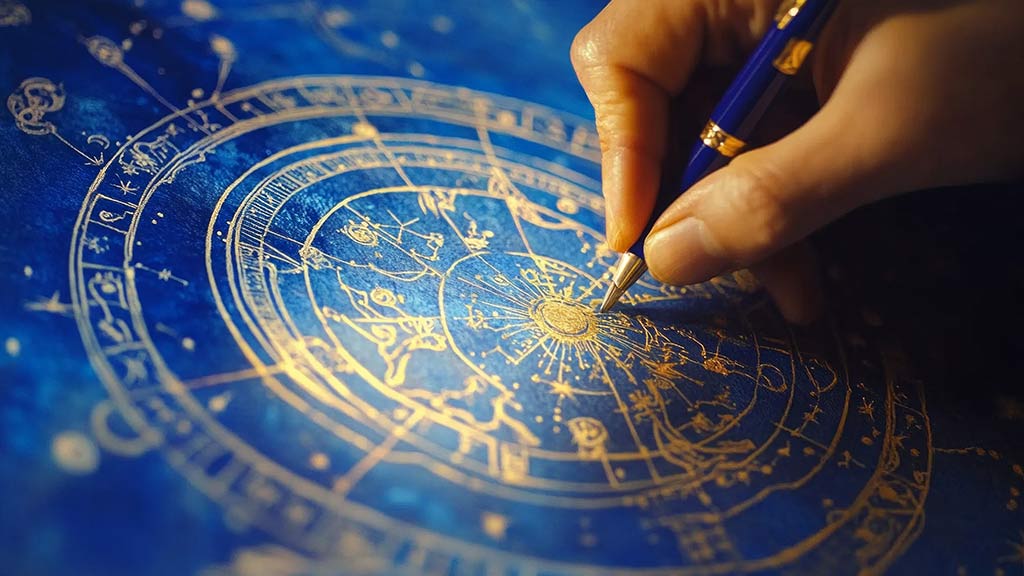Astrology isn’t a word; it’s like a deep ocean. Astrology is one of the oldest concepts that some still believe in. This blog article will go into identifying the meaning of astrology, the origins of astrology, what role astrology plays in different cultures, and finally examining the scientific basis of astrology.
What is Astrology?
The meaning of astrology is systematic examination. And it’s about planetary positions in order to reveal personal features or traits and forecast approaching occurrences. In essence, it is a method for comprehending humans by analyzing the arrangements of spiritual bodies for the present and future. Currently, astrology is perceived as a means of communication and a symbol, not only as an artistic expression or a technique or method for divination. Although astronomy and astrology originated from the same source in the past, they have separated now. There are five essential and primary components in astrology. Those are, namely, conjunctions, sextiles, squares, trines, and oppositions, according to the astrological analyses. These primary elements have an influence on work-related astrology, like readings of astrology, molding the storyline of a human life as an individual. Astrology’s core rests in interpreting the alignments of planets and providing insight factors into personal traits and their future potentials.
Astrology originated by
Mesopotamia, in the 3rd millennium BC, is where the origins of astrology can be traced. Its next destination was India, but the other way around, its’ Western version was molded in Greek civilization during the Hellenistic period.
In the United States, most contemporary astrology revolves around the 12 zodiac signs. In the United States, we use Virgo and Aries. In ancient times, academic discipline was the most frequently confused factor in early Western astrology. Astrologers utilized and focused characteristic observations of individuals to create a set of predictions as principles for future incidences on Earth.
It was regarded as pseudoscience at the end of the 17th century. And from the 16th to the 19th centuries, capturing the evolving public perceptions of this subject. Such as special collections, records house frequent volumes. Facets and components are various in what astrology encompasses. Astrology refers to aspects in an angular relationship, and planets have a correlation and/or effect in the horoscope, as well as their relationship to other significant points. Some of them are the ascendant, midheaven, descendant, lower midheaven, and other points of significance in astrology. Between two points of ecliptic longitude and angular separation, aspects are determined by the uttered in degrees and can be observed by the earth. Celestial bodies can identify the precise timing of shifts. According to the tradition of astrology, there are stages of growth in the lives of people and occasions that are related to the earth.
The cultural importance of astrology
The meaning of astronomical phenomena has been attributed to various cultures. Complicated methods for forecasting earthly events based on observations of celestial occurrences had been devised by Indians, Chinese, and Maya. The oldest globe in the history of astrology has had a substantial impact on ancient cultures. Mesopotamia, Egypt, Greece, and India played a significant role in various ancient civilizations in astrology. It affected culture, religion, religious rituals, political choices, and personal convictions. These kinds of cultures suggest that the placement of spiritual bodies has important significance and has an impact on human fate. Astrology’s historical factors are important and serve as evidence of humanity’s current captivation of people all over the world among various cultures. Astrology is a method for introspection and a tool for making human choices, or it’s a technique to establish a correlation with the cosmos that still fascinates. And it stimulates curiosity in our modern society.
Science and astrology
Due to its lack of explanatory capacity in describing the universe, the scientific community has dismissed it as a science. But astrological traditions are accepted by empirical testing, which has generated no substantiation for the premises or the effects described. There are certain scientific characteristics in astrology exhibits. It employs scientific expertise regarding a few factors, such as celestial objects, along with scientific instruments that look like star charts. Astrology is utilized by certain individuals to form predictions. It’s all about approaching occurrences and individuals’ features, similar to how we develop expectancies in scientific concepts. However, despite including these scientific elements, can astrology truly be considered a scientific method for addressing inquiries?
Astrology is not magic, and it’s generally seen as pseudoscientific. It asserts that celestial motions have an influence on human existence. Emerging in ancient Mesopotamia, it underwent a process of development influenced by several cultural factors worldwide. Although it was once associated with astronomy, in the 17th century it lost its scientific validity. Astrology is a worldwide representation of the interaction between celestial bodies that influences. And it is one of the things that changes and develops in life. Astrology incorporates scientific components, and the connection of ancient beliefs to present-day times lacks scientific confirmation. However, its appeal remains strong, taking individuals even in the absence of scientific accuracy.

